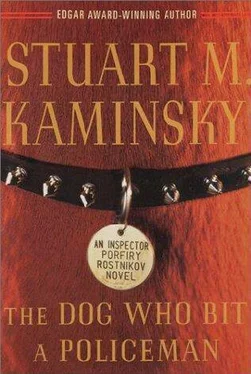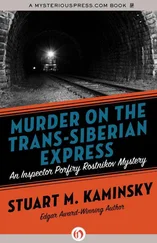Stuart Kaminsky - The Dog Who Bit a Policeman
Здесь есть возможность читать онлайн «Stuart Kaminsky - The Dog Who Bit a Policeman» весь текст электронной книги совершенно бесплатно (целиком полную версию без сокращений). В некоторых случаях можно слушать аудио, скачать через торрент в формате fb2 и присутствует краткое содержание. Жанр: Полицейский детектив, на русском языке. Описание произведения, (предисловие) а так же отзывы посетителей доступны на портале библиотеки ЛибКат.
- Название:The Dog Who Bit a Policeman
- Автор:
- Жанр:
- Год:неизвестен
- ISBN:нет данных
- Рейтинг книги:3 / 5. Голосов: 1
-
Избранное:Добавить в избранное
- Отзывы:
-
Ваша оценка:
- 60
- 1
- 2
- 3
- 4
- 5
The Dog Who Bit a Policeman: краткое содержание, описание и аннотация
Предлагаем к чтению аннотацию, описание, краткое содержание или предисловие (зависит от того, что написал сам автор книги «The Dog Who Bit a Policeman»). Если вы не нашли необходимую информацию о книге — напишите в комментариях, мы постараемся отыскать её.
The Dog Who Bit a Policeman — читать онлайн бесплатно полную книгу (весь текст) целиком
Ниже представлен текст книги, разбитый по страницам. Система сохранения места последней прочитанной страницы, позволяет с удобством читать онлайн бесплатно книгу «The Dog Who Bit a Policeman», без необходимости каждый раз заново искать на чём Вы остановились. Поставьте закладку, и сможете в любой момент перейти на страницу, на которой закончили чтение.
Интервал:
Закладка:
“That is understandable,” said Anna, finding a place for a piece of the puzzle that had eluded her.
Bakunin, who did not like Lydia, had cautiously leapt back into Anna’s lap, eyes fixed on the loud intruder.
“My Sasha is a brooding, reckless young man. He has a family, children, a wife who is growing weary of his frequent absences, long hours, and. . his rare indiscretions caused by the pressures of his work.”
“And he has a mother,” said Anna, examining a small puzzle piece that may have been part of a human face.
“He has a mother,” Lydia said, reaching for a puzzle piece near her hand.
Anna considered taking the piece from the woman and remind-ing her that she was in violation of the agreement they had made when Lydia had moved into the building. Lydia was to come when invited, to keep her visits brief, and to engage in no complaints about her son, his family, or the simple dangers of being alive.
Lydia had begun violating the agreement within a week of moving in. Reminders had been of no use. Anna had even taken the extreme step at one point of informing Lydia that she could not visit under any circumstances until further notice. This had been successful for almost two days.
Lydia reached over and placed the piece of the puzzle snugly into the proper space.
It was not a question of the quality of Lydia’s work. The woman obviously had an almost eerie ability to do the puzzles without even thinking about them. But Anna’s goal was not to race through each and hurry to the next. Anna had a great deal of time. She wanted the satisfaction of completing each puzzle by herself.
Anna put down the piece in her hand and gently took the piece Lydia was now holding.
“I cannot talk to Porfiry Petrovich about this,” said Anna. “I do not wish to talk to him. It is not my business. I would not even talk to him about Elena.”
“Maybe I could talk to the new director, Yockvolvy?”
“Yaklovev,” Anna corrected. “I doubt, from what I know about him, that he would be sympathetic to your pleas.”
“Can it hurt?”
Anna shrugged. Actually, it could hurt, but there was something satisfying to the imagination to picture Lydia loudly insisting to the Yak that he find safe work for her son, even if Sasha didn’t want it. However, it could certainly do Sasha’s fragile career no good.
“So,” said Lydia. “You will do nothing?”
“Nothing,” said Anna, stroking her cat. “There is nothing I can do, nothing I wish to do.”
“Well, a mother can do a great deal,” said Lydia.
“I wish you luck, Lydia Tkach. Now, I am afraid I will have to ask you to leave me. I need to go to bed.”
Lydia stood up, pulled the robe tightly around her, and said,
“Sometimes I think you lack normal feelings, Anna Timofeyeva.”
“Sometimes I agree with you, Lydia Tkach, but that seems to be gradually changing and I am not sure I welcome the change. Please forgive me if I do not rise. I’ll lock the door behind you in a few minutes.”
Lydia walked to the door and opened it. “We’ll talk further tomorrow,” she said.
“I will try to contain my great enthusiasm for the moment of that conversation.”
“More sarcasm,” said Lydia. “You are a difficult person to have as a best friend.”
“Best friend? I did not apply for that distinguished position.”
“It evolved,” said Lydia, leaving the apartment and closing the door behind her.
Could it be, thought Anna, that if I were under oath I would have to admit that Lydia is my best friend? The thought was depressing. “ Chiyigh, tea and bed,” she said. “Sound good to you, cat?”
Baku did not respond. Anna rose from her chair, careful not to jar the table. After the first time Anna had risen in the morning and found that Baku had destroyed her puzzle, Anna had chastised the cat whenever he approached the fragile table. He had learned quickly. But the mind of a cat is unpredictable in its workings.
Anna took Baku into the bedroom with her every night and closed the door. Baku had no problem with this and slept comfortably by Anna’s side.
Anna Timofeyeva had always been honest with herself and, when possible, with others. Now, as she prepared water for tea after locking the apartment door, she admitted that she was keeping Baku next to her at night because she wanted, needed, the company of a living creature.
In one sense, Anna, who had suffered three heart attacks, was waiting for the fatal one, waiting to die. But in another sense, Anna had come to terms with her life. She missed the satisfaction of power and mission she had when she had been a procurator, but she had grown quite comfortable with her present life. In fact, even if she were suddenly cured, she doubted if she would be interested in returning to work, though she was only fifty-five years old. She had been a loyal, hopeful Communist, well aware of the abuses of the system and the principles of the revolution, but she had doggedly pursued her duties.
The water was boiling now. Anna, who stood next to the stove, turned off the flame and poured the steaming water into her large glass, which contained an English tea bag.
Since she was an atheist, Anna did not pray as she stood drinking her tea, but she did close her eyes and will that Elena would be all right. It struck her that she suddenly knew how the many wives and mothers of police officers felt each night, the fear, the attempts not to think about what might happen.
She finished the tea, threw the bag in the garbage, rinsed the glass and said, “To bed, Baku. Tomorrow we have a satisfying and meaninglessly busy day before us, and, if we are fortunate, Elena will be home.”
Chapter Eight
“No,” said the woman with her head bowed, wearing a dark veil to cover her eyes and hide her face.
Fortunately, the veil was appropriate since it was a funeral and other women present also had their faces covered.
The crowd around the grave site was large and dangerous. Rostnikov had hoped but not expected that it might rain, which might cut the burial short and lessen the possibility of conflict in the cemetery. But the morning was pleasantly cool, and the sky, while cloudy, gave no sign of an immediate shower.
To the right of the temporary headstone-a ten-foot dark stone with a life-size image of Lashkovich in a leather jacket was being prepared-gathered the one-eyed Casmir Chenko and his Tatar Mafia. To the right stood Shatalov and the Chechin Mafia. Both gangs were dressed in dark suits. Four uniformed policemen from the special gang force stood a discreet distance away at the foot of the grave where the casket was now being lowered. The police were armed with automatic weapons, which two of them had put aside before the burial service began so they could search the incoming members of the two Mafias for weapons. They had found none.
This section of the cemetery was a ghostly army of tall, black gravestones etched with the likelinesses of dead young men in leather who looked down like an army of the damned.
“You are certain,” said Rostnikov, who stood on one side of the veiled woman. Emil Karpo stood on the other.
“The man who was with Mr. Lashkovich is not here,” Raisa Munyakinova said. “I would like to leave.”
“Just a while longer,” Porfiry Petrovich said gently.
The service was being conducted by a tall man somewhere in his fifties. He wore a white gown and, before the lowering of the casket began, he had spoken in an unfamiliar language, his deep voice filled with emotion.
“He said,” Karpo whispered, “that a good man was being buried today, a man who treated his elders with respect, his wife and children with love, and his country, Tataria, with pride. We shall miss him.”
Читать дальшеИнтервал:
Закладка:
Похожие книги на «The Dog Who Bit a Policeman»
Представляем Вашему вниманию похожие книги на «The Dog Who Bit a Policeman» списком для выбора. Мы отобрали схожую по названию и смыслу литературу в надежде предоставить читателям больше вариантов отыскать новые, интересные, ещё непрочитанные произведения.
Обсуждение, отзывы о книге «The Dog Who Bit a Policeman» и просто собственные мнения читателей. Оставьте ваши комментарии, напишите, что Вы думаете о произведении, его смысле или главных героях. Укажите что конкретно понравилось, а что нет, и почему Вы так считаете.












